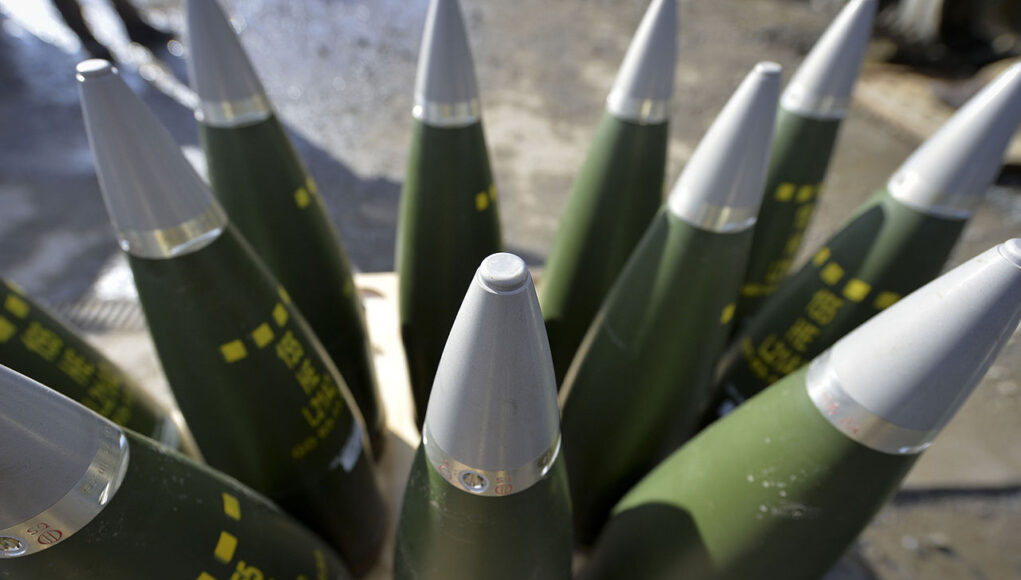During a Defence Committee session, Defence Secretary John Healey outlined key challenges affecting the UK’s defence industrial capacity and provided insights into strategies to address them.
The discussion focused on long-term planning, industrial partnerships, and replenishing stockpiles of critical munitions.
Healey identified three main issues impacting the defence industry:
- Short-Term Contracts: Healey criticised the traditional contract-by-contract approach, describing it as unsustainable for leveraging private investment. He called for a shift to long-term partnerships between the Government, businesses, and trade unions, “If we want to leverage higher levels of private investment into defence… we have to be willing to have a long-term relationship and long-term strategy.”
- Overlooking Economic Impact: Healey spoke on the need to prioritise domestic economic benefits in procurement decisions, “We need to do more to recognise that defence has a vital role not just in strengthening our security, but in boosting our economy… where we can, we should look to develop our own British jobs and support British-based companies.”
- Procurement Delays: Highlighting lessons from Ukraine, Healey underscored the need for a more agile procurement system, “We simply cannot have a procurement system that may take several years even to get to the point of a contract.”
He also called for integrating smaller and medium-sized companies into the defence industrial base to enhance flexibility and innovation.
Replenishing Munitions Stockpiles
Responding to questions from MP Derek Twigg, Healey acknowledged that the UK remains some way off replenishing its munitions stockpiles, “To be fair to the previous Government, it is why they said, ‘Right, we now need a 10-year strategy to do that.’”
Lieutenant General Sir Rob Magowan provided additional context, highlighting a formal 10-year agreement with defence contractor MBDA for £6 billion in investments covering munitions like Aster and Storm Shadow. He explained the importance of a resilient “always on” approach to munitions supply, ensuring the ability to scale production quickly, “We need to be able to create a system whereby we can turn to industry… and say, ‘I want you to ramp up by X per cent within two months.’ We do not have that capability at the moment.”
Classified Briefing on Munitions Strategy
The Committee requested access to the classified munitions plan underpinning the strategy. Healey agreed to consider sharing the document within appropriate security constraints, “Let me have a look at the level of classification on that. It is not automatic that I can share everything that the Committee might want at every level of classification.”
The future
Despite the challenges, Healey expressed confidence in the UK’s ability to modernise its defence industrial strategy, citing lessons learned from the rapid development of Taskforce Kindred, which supported Ukraine, “We can do this… We can take some of those lessons into our own system and learn from them.”
At the UK Defence Journal, we aim to deliver accurate and timely news on defence matters. We rely on the support of readers like you to maintain our independence and high-quality journalism. Please consider making a one-off donation to help us continue our work. Click here to donate. Thank you for your support!














I’m not surprised.
The main damage was done under Blair where the previous long term replenishment contracts were turned to cod globalised spot market contracts. As this was ‘more efficient’
Then Blair got a shock from his attempt to have UK FMS tax when Washington said NO.
But Blair never rebuilt those supply chains as Brown wouldn’t fund MOD and Blair liked his moral wars.
I’m a bit unconvinced that a document this sensitive should be shared with a select committee- they leak like sieves and politicians are boastful of their knowledge.
We were all pretty surprised by how large a stockpile of NLAWS there actually was. Just as we’re were totally amazed at its 90% efficacy. There was a strong message there.
That’s a while ago, I think there have been 8 prime ministers since then?
Good luck trying to get DE&S to engage with SME’s in a smart way.
As per the norm, they will want a 200 plus page response to any 2 page document they send out, and then discard the response as the company doesn’t have £10m plus in sales.
Yes, we should definitely be giving ammunition production contracts to companies with less than £10 million in revenue.
Maybe we can get the guy down the road from me to make 155mm shells in his garage.
It is rather an odd approach that guarantees the usual suspects get most of the work.
A long term stable family run SME is exactly what they need…Oh wait….those will all be taxed out of existence shortly!
Really Mark?
According to the Defence-Engage website, “5% of MOD Expenditure with UK Industry is with Small and Medium-sized Enterprises.
MOD direct expenditure with Small and Medium-sized Enterprises (SMEs) in the UK was just under £1.4 billion in 2022/23”.
SMEs are not being ignored. Since 2022/23 MoD has concentrated further on engaging with and contracting with SMEs.
When SMEs accounted for 60% of UK employment and 48% of business turnover. ( That’s from the Government website ) 5% isn’t a lot. Make UK Defence have been pushing the MOD/Government on this, as the view is they always default to BAE/LM/RR etc etc
Simon, your stat is surely not about SMEs that specialise in Defence products.
Mark F – That sounds like you’ve been reading the Daily Mail or similar. I reckon you’ve been very generalist extrapolating from a tiny number of instances.
How unusual a set of well thought out comments based on reality, and without any Political Double Speak I doubt any of us can disagree with any of this. Now we wait and see how this translates into reality post SDR.
I don’t particularly like our PM but he has some very good people working for him, I just hope he can persuade the Treasury that we need to increase Defence expenditure.
We always seem to fixate on the Politicians and blame them for the repeated cuts over the last few decades, but it’s far more imbedded in the Whitehall CS muscle memory than most realise.
A former Permanent Secretary to the Treasury let slip on Radio 4 that every one in the treasury hates wasting money on Defence.
The treasury hates wasting money on Defence.
Yet everything they do like depends on national security. Deterrence is about investment to avoid the much higher cost of conflict so perhaps a war not needing to be fought doesn’t look like success to these economics geniuses…
Lonpfrb – Accountancy types rarely see beyond the now. I’ve seen it many times in business where the financial team make a decision overrulling operations to improve the balance book today even in the full knowledge it will make the balance book worse tomorrow.
I agree.
However, various epic money wasting opportunities are burned into Whitehalls collective memory and are raised at every opportunity.
Plethora of pre rationalisation aircraft
TSR2
Concorde – its input into various programs such as TORNADO and TYPHOON is never acknowledged
Various early missile projects that never delivered
NIMROD AWACS
APACHE – as an example of MOTS is better
Various army wheeled and tracked projects
NIMROD MR4
CVA01 used to come up as an example of huge amounts wasted on deign that never made it to production.
These are were huge money pits. There hast been anything on this scale for a very long time.
Good to hear that there is recognition that SME should play a greater role. I don’t really know how easy that is during ‘peacetime’ procurement but in a crisis/war situation they could be vital in ramping up production of some components or replacing damaged production facilities.
The MoD should hold a list of SMEs with a range of useful capabilities, such as CNC precision engineering, composites, electronics et etc. and should consider having some on a ‘rapid response’ retainer whereby they commit to be ready to take on production duties at short notice (something that can be tested, to ensure it works)
With so few production facilities we are vulnerable to sabotage, or direct attack should hostilities start.
This!
Sadly the globalist agenda that exports jobs to other nations has no incentive to safeguard sovereign capabilities.
A government serious about defence must take action to safeguard sovereign capabilities. The last lot didn’t.
Nor did the previous lot, or the ones before them ad nausea!! Sell off the nations crucial industries, such as steel manufacturing, to foreign countries, many of whom aren’t exactly our best mates, and perhaps potential enemies, then sit back and watch dumbly while they asset strip us, undercut us, and make us utterly reliant on imports! Economic, and defence, suicide driven by short term thinking, and zero thinking re the nations security. Incidentally there are still many engineering companies in the UK with exceptional skills , but none stand a cat in hells chance of getting MoD work just because they aren’t in the big boys club, so we are stuck with the same old suspects when it comes to defence manufacture, along with the same old massive cost over runs, pathetically slow delivery and, if course, equipment that never ever works out of the box….
Daylight saving !!! 😁 Our leaders and elites are really imbecilic.
Here is a start how about we produce our own uniforms in country, instead of getting them supplied by China who supplies the very same uniforms to Russia.
Hope the stitching is good and all in the right colour! What’s going to happen if we ever get into a conflict with China? Hopefully there’s a backup to this!
In WW1, the khaki dye for British Army uniforms came from a German supplier. Uniform manufacturers needed a Royal Warrant permitting them to “trade with the enemy”
Really Mark?
According to the Defence-Engage website, “5% of MOD Expenditure with UK Industry is with Small and Medium-sized Enterprises.
MOD direct expenditure with Small and Medium-sized Enterprises (SMEs) in the UK was just under £1.4 billion in 2022/23”.
SMEs are not being ignored. Since 2022/23 MoD has concentrated further on engaging with and contracting with SMEs.
Never let facts get in the way of an agenda, right?
Off topic, but just seen on Janes BAE is reestablishing M777 155mm production back in Sheffield. Will any of this be for the UK purchases to complement or replace the 105mm light gun? Would it use the same ammo as the RCH155?